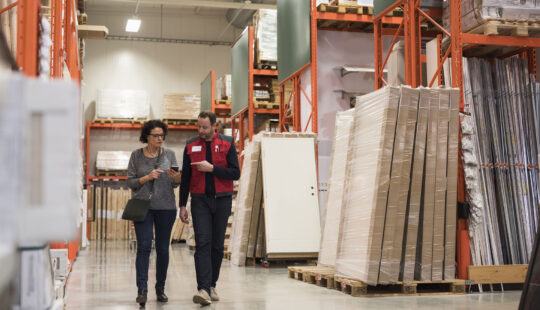Industrial manufacturing companies face a constantly evolving landscape of logistics operations. In a recent interview, Till Dengel, global head of Logistics and Manufacturing Solution Management at SAP, shared valuable insights into the trends, challenges, and technologies shaping the world of manufacturing logistics. Discover how your business can drive an agile, resilient, and sustainable logistics network with Dengel’s expert advice.

Q: What are some of the trends and challenges manufacturing companies are facing today when it comes to logistics operations?
A: The logistics operations landscape has undergone significant changes, particularly due to the COVID-19 pandemic. Previously, the focus was on increasing efficiency and implementing just-in-time and just-in-sequence models to reduce inventory. However, the pandemic highlighted the need for supply chain resiliency alongside efficiency. Manufacturing companies now require greater foresight, agility, and flexibility to address unforeseen disruptions, such as supplier bankruptcies and border closures. Transparency, particularly regarding the origins and ethical sourcing of goods, has also emerged as a significant trend. Additionally, sustainability plays a crucial role, as companies aim to reduce emissions and waste and promote greater social equality across their value chains.
How have logistics operations for manufacturing companies evolved in recent years? And what kind of capabilities or technologies are they looking for to help them navigate the future of industrial manufacturing?
Logistics operations for manufacturing companies have undergone significant transformations in recent years. The focus has shifted from purely efficiency-driven approaches to those encompassing resiliency, visibility, and sustainability. Industrial manufacturing companies already rely on a high degree of automation in their processes. However, they are increasingly turning to robotics technologies to further enhance operational efficiency. By leveraging robots, workers can complete tasks such as material transportation and inventory management more quickly and efficiently.
Companies also seek greater supply chain transparency, requiring solutions that provide real-time tracking and tracing data to proactively manage disruptions and comply with sustainability regulations. Improved visibility into warehouse operations is another key capability. With advancements in big data technologies, business leaders can gain helpful insights and optimize processes for better resource allocation and reduction of waste. For example, visualizing movement patterns within the warehouse allows companies to identify and eliminate bottlenecks. Technology plays a crucial role in driving efficiency, agility, and sustainability in logistics operations.
How can SAP help address these trends and challenges?
SAP offers an array of solutions to help address the emerging trends and challenges in logistics operations. For instance, the SAP Warehouse Robotics solution can integrate the warehouse management system with various vendors, enabling the deployment of robots in the warehouse to help enhance efficiency and automation. SAP Business Network for Logistics can connect carriers and logistics providers through a unified network.
Within SAP Business Network for Logistics, several solutions are available. SAP Business Network, intelligent insights add-on can provide a comprehensive overview of goods in motion, helping companies identify bottlenecks and focus on areas that require attention. SAP Business Network Material Traceability helps improve transparency, visibility, sustainability, and efficiency by connecting the entire supply chain. SAP Business Network Global Track and Trace can provide real-time insights into material and product availability, helping to reduce supply chain risks and optimize costs. It can also proactively raise alerts to users in case of any issues. Lastly, SAP Business Network Freight Collaboration can connect business partners on a collaborative network, facilitating insights sharing across the value chain. With these technologies, business leaders can access the necessary capabilities to help enhance their logistics operations.
How does SAP Business Network for Logistics help generate value for the customer in the areas of compliance and sustainability?
SAP Business Network for Logistics can generate tangible value for customers in the areas of compliance and sustainability. Once the information passes through the SAP systems, business leaders can gain transparency into the origins and movement of goods, facilitating compliance with regulations and ethical sourcing standards. And customers can start aggregating the data, reporting on it, and acting on the insights. This includes capturing carbon emissions data, gaining more details around material traceability, and making sure that vendors do not use child labor – all with audit-ready data. Compliance and sustainability will only gain increasing importance in the years to come, and the companies of tomorrow must equip themselves with the proper tools today.
Explore our infographic showcasing eight industry cloud solutions from SAP that help you apply best and next practices, so you can manage a more agile, resilient, and sustainable logistics network.
Kelly Cannon is part of Content Creation & Strategy for the Content Lab at SAP.



